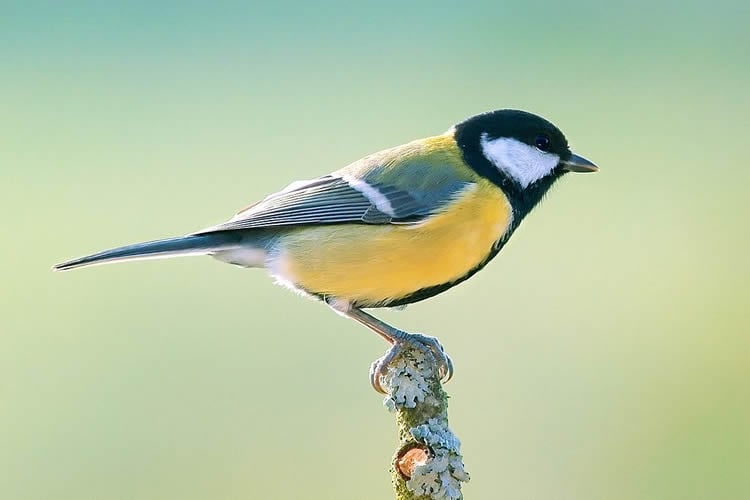Summary: Researchers report the great tit, a common European songbird, has similar impulse control to that of larger, more cognitively advanced animals.
Source: Lund University.
Biologists at Lund University in Sweden have in a recent study shown that the great tit, a common European songbird, has a tremendous capacity for self-control. Up to now, such impulse control has been primarily associated with larger cognitively advanced animals with far larger brains than the great tit. According to the new results, the great tits’ ability for self-control is almost the same as that of ravens and chimpanzees.
The biologists placed food in a small translucent cylinder. The great tits that started pecking at the cylinder to get to the food failed the test as the behaviour was considered an impulsive act. Those that, on the other hand, moved to an opening in the cylinder and thereby were able to access the food without pecking at the cylinder wall passed the test.
The results show that the great tits did the right thing and succeeded in eight of the first ten attempts, i.e. 80 per cent of the time. This is better than most other animals tested and is almost on a par with “intelligent” animals such as ravens and chimpanzees.
“It’s amazing that a bird with such a small brain has this type of self-control. The brain volume of a great tit corresponds to 3 per cent of a raven’s brain and 0.1 per cent of a chimpanzee’s”, says Anders Brodin, professor at the Department of Biology.

The study was conducted by Anders Brodin, in collaboration with colleagues Utku Urhan and Emil Isaksson. A few years ago, these Lund University biologists discovered another ability of great tits – an unusually high ability to learn and to remember by observing.
That study showed that great tits can sit and observe at a distance, and memorise where species that store food hide their treats. The study also showed that females generally outperform their male counterparts in this respect. In this study, the great tits were compared with their close relatives, the marsh tit and the willow tit. Unlike the marsh and willow tits, great tits do not store food to survive the winter. Instead, they can observe where their relatives hide their food and subsequently steal it.
“Great tits are very resourceful small birds. Now we know that they also have great self-control and can handle their impulses when they want to gain access to a reward such as food”, says Anders Brodin.
Source: Anders Brodin – Lund University
Publisher: Organized by NeuroscienceNews.com.
Image Source: NeuroscienceNews.com image is credited to Luc Viatour. License CC BY SA 2.0.
Original Research: Open access research for “High level of self-control ability in a small passerine bird” by Emil Isaksson, A. Utku Urhan, and Anders Brodin in Behavioral Ecology and Sociobiology. Published July 2018.
doi:10.1007/s00265-018-2529-z
[cbtabs][cbtab title=”MLA”]Lund University”Great Tit Birds Have as Much Impulse Control as Chimps.” NeuroscienceNews. NeuroscienceNews, 30 July 2018.
<https://neurosciencenews.com/bird-chimp-impulse-control-9626/>.[/cbtab][cbtab title=”APA”]Lund University(2018, July 30). Great Tit Birds Have as Much Impulse Control as Chimps. NeuroscienceNews. Retrieved July 30, 2018 from https://neurosciencenews.com/bird-chimp-impulse-control-9626/[/cbtab][cbtab title=”Chicago”]Lund University”Great Tit Birds Have as Much Impulse Control as Chimps.” https://neurosciencenews.com/bird-chimp-impulse-control-9626/ (accessed July 30, 2018).[/cbtab][/cbtabs]
Abstract
High level of self-control ability in a small passerine bird
Cognitively advanced animals are usually assumed to possess better self-control, or ability to decline immediate rewards in favour of delayed ones, than less cognitively advanced animals. It has been claimed that the best predictor of high such ability is absolute brain volume meaning that large-brained animals should perform better than small-brained ones. We tested self-control ability in the great tit, a small passerine. In the common test of this ability, the animal is presented with a transparent cylinder that contains a piece of food. If the animal tries to take the reward through the transparent wall of the cylinder, this is considered an impulsive act and it fails the test. If it moves to an opening and takes the reward this way, it passes the test. The average performance of our great tits was 80%, higher than most animals that have been tested and almost in level with the performance in corvids and apes. This is remarkable considering that the brain volume of a great tit is 3% of that of a raven and 0.1% of that of a chimpanzee.






